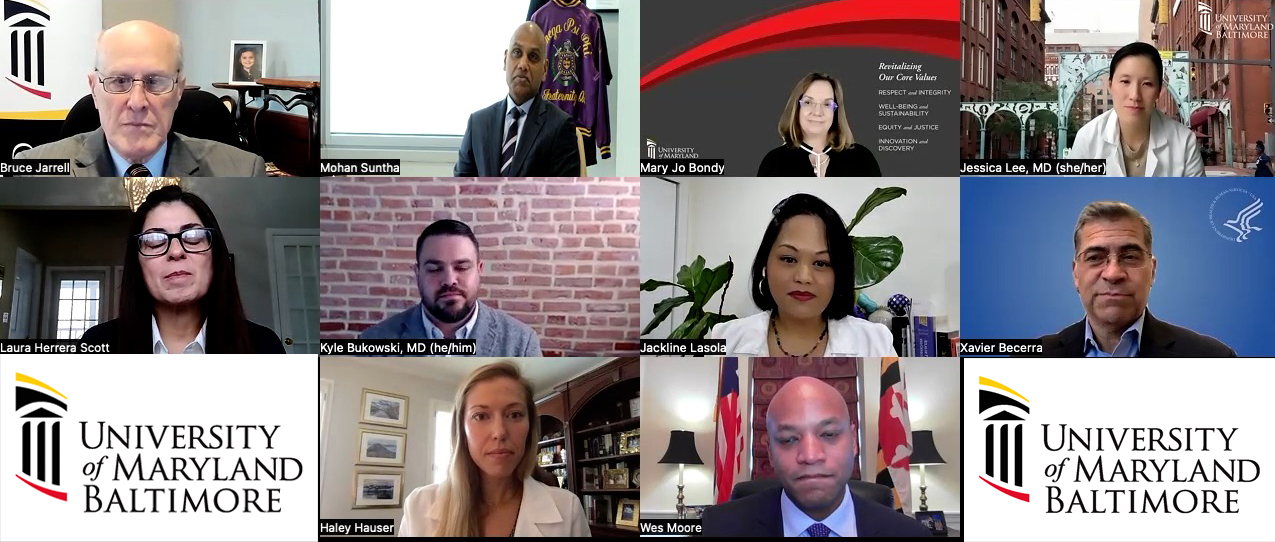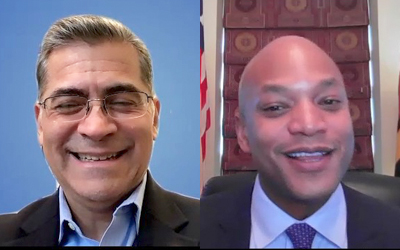U.S. Department of Health and Human Services (HHS) Secretary Xavier Becerra led a discussion of the state of women’s health care and reproductive rights at the University of Maryland, Baltimore (UMB) on Jan. 19 ahead of the 51st anniversary of the U.S. Supreme Court’s landmark Roe v. Wade decision. Becerra was joined by Maryland Gov. Wes Moore in the back-and-forth discussion with UMB faculty and students, as well as UMB President Bruce E. Jarrell, MD, FACS, and representatives from the Maryland Department of Health, University of Maryland Medical System, and Planned Parenthood.
The open-dialogue conversation, initially scheduled as an in-person roundtable on UMB’s campus, was moved online due to that day’s snowstorm. During the virtual meeting, participants spoke about their firsthand experience navigating reproductive health care in the wake of Dobbs v. Jackson Women’s Health Organization, in which the U.S. Supreme Court held that the Constitution does not confer a right to abortion.

HHS Secretary Xavier Becerra, Maryland Governor Wes Moore, UMB President Bruce E. Jarrell, University faculty and students, and representatives from the Maryland Department of Health, UMMS, and Planned Parenthood discuss women’s health care and reproductive rights ahead of the Roe v. Wade anniversary.
“We’re launching this tour around the anniversary of Roe because it’s so important to again emphasize what we had and what we need to get back and how we can do better,” Becerra said in opening remarks.
In welcoming the secretary and governor to the event, Jarrell pointed to the University’s unique position in preparing health care providers for the region. “This is not your usual university. We are a university very focused in health care training, discovery, and delivery in partnership with the University of Maryland Medical System,” he said, adding that the University is home to 3,500 health care students and over 900 postgraduate residents.
Jarrell also asked how participants in the conversation could support efforts to protect reproductive health care for women in Maryland and across the nation.
Becerra said that testimony from health care professionals and medical students is essential to educating the public about the impact the Dobbs decision has had on reproductive health care access in all states.
“It is now to the point where a woman has to ask, ‘What is my ZIP code?’ so she knows what her rights are. That’s a pretty devastating statement about the democracy in this country,” he said. “At the same time, we know that there are people making choices that are detrimental to their health or someone else’s health simply because of what happened in the Dobbs decision.”
Moore spoke about steps taken by his administration to protect abortion access in the wake of Dobbs, including partnering with UMMS to purchase a stockpile of mifepristone, one of the medications prescribed for medical abortions. He vowed to continue to fight at the state level to protect those rights and expand access to reproductive health care.
“Maryland will continue to be a safe haven for abortion access as long as I’m the governor,” Moore said. “We owe it to ourselves and to the people of our state, to the people of our country, to ensure that basic reproductive health care is a right and not a privilege.”
Some of the discussion’s most compelling testimony came from UMB faculty as well as current medical students.
Jessica K. Lee, MD, assistant professor in the Department of Obstetrics, Gynecology, and Reproductive Sciences at the University of Maryland School of Medicine (UMSOM), and a primary care physician at UMMS, said in the immediate aftermath of the Dobbs decision, “I had patients, Maryland patients, calling me saying, ‘Is abortion still legal in Maryland?’ Because that’s how confusing legislation is when these court rulings go out. People thought we were closed that day while we were still providing abortion care and reproductive care.”
She went on to say that the volume of out-of-state patients has increased since the decision, noting that the upsurge is due in part to BWI Thurgood Marshall Airport’s status as a Southwest Airlines hub. “People find it cheaper to fly to us than to even drive to other states,” she explained. “So, we are really becoming a safe haven for patients in those other states that cannot seek care.”
Mary Jo Bondy, DHED, MHS, PA-C, faculty and program director of the Doctor of Medical Science program at the University of Maryland Graduate School, pointed to the importance of training funds allocated in Maryland’s Abortion Care Access Act, which expanded the scope of practice for certain health care providers and created the Abortion Care Clinical Training Program.
She discussed UMB’s commitment to interprofessional education and the benefits of team-based care delivery and said the approach to improve access to contraceptive and abortion care is being made “through an abundance lens rather than a scarcity lens.”
“We have over 4,000 PAs [physician assistants] in the state of Maryland and over 4,000 licensed family nurse practitioners who can come alongside our physician colleagues and really help extend access to care and do it safely and competently,” Bondy said. “We’ve designed an opt- in fellowship program that will model team-based care. It’ll be taught by multiple providers, and it will include didactic simulation and clinical training to upskill the current licensed workforce.”
Jackline Lasola and Haley Hauser, both students at UMSOM seeking obstetrics and gynecology (OBGYN) placements after their graduation in 2024, spoke about their experiences in the current environment as they prepare to become residents.
Lasola noted she has met talented physicians in training around the country who identify strongly with communities that are restricted in the types of abortion services they provide, but added, “They know that to train in that state would mean that they’re severely limiting their actual training.”
She said that while programs in restrictive states are trying to partner with states more open to abortion care, such approaches shortchange physicians in training.
“The reality of it is that if you’re not able to practice the skills — and that includes both the actual technical skills as well as the ability to counsel patients accurately in the moment of a clinical encounter — you’re not getting the training that you need in order to provide obstetric and gynecology care in a way that is equitable as well as comprehensive,” Lasola said.
Hauser emphasized the effect the Dobbs decision had on medical students interested in the OBGYN field.
“We go into medicine to help people, and throughout our training we’re constantly taught to do what’s best for the patient at all costs,” she explained, adding that abortion restrictions mean that physicians are being told from an outside source that they can’t act in the patient’s best interest — something that leads medical students to question how they would react to such circumstances as a future physician.
“I think it is impacting people’s decisions to go into OBGYN or not, which is devastating,” Hauser said, though she added, “But those of us that have chosen to go into OBGYN are even more excited to join the field and join the fight and continue to fight for our future patients and provide them that access that they deserve.”
Toward the discussion’s conclusion, Jarrell noted that UMMS has shifted from a fee-for-service model to a global-based budgeting model that rewards value-based care and population health. UMMS president and CEO Mohan Suntha, MD, MBA, who also took part in the event, spoke about the effect value-based medicine can have relative to women’s health.
“When you think about women’s reproductive health care rights, when you think about women’s health care overall, and you put it within the context of this evolution that the state of Maryland is driving for the nation — which is really a value-based health care model — it really does drive investment in keeping communities healthy,” he said.
In addition to representatives from UMB and the state’s medical system, others attending the discussion included Maryland Secretary of Health Laura Herrera Scott, MD, MPH, and Kyle Bukowski, MD, FACOG, chief medical officer at Planned Parenthood of Maryland.
In Moore’s closing remarks, he applauded all who recounted their experiences. “These are some of the people that make us so proud to be Marylanders and make me incredibly proud to be the state’s governor,” he said. “We know that our ability to be able to protect reproductive rights — it is going to be all hands on deck.”
Becerra added, “At the end of the day, it is about control — who controls your body and who controls your destiny. Because if you don’t control your body, there’s a very good chance that you don’t get to control your destiny.”



